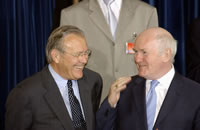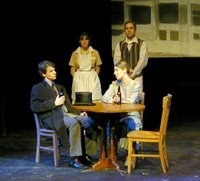To Review: The Oshkosh Common Council plans to go into closed session on Tuesday night to discuss financing of the Five Rivers Resort proposal. City Hall claims the meeting is legal under Wisconsin statute 19.85(1)(e) Deliberating or negotiating the purchasing of public properties, the investing of public funds, or conducting other specified public business, whenever competitive or bargaining reasons require a closed session.
In response to my statement of the obvious--that the closed meeting will be clearly illegal according to the plain language of the statute--city attorney Warren Kraft sent this email to the Councilors on Monday:
"Four Council members either telephoned or e-mailed me about Mr. Palmiri's (sic) website claims. It appears that Mr. Palmiri is assuming that all negotiations have concluded, and a contract is developed and ready for Council approval. Until such time as those assumptions become reality, there are sufficient "competitive bargaining reasons' to permit a closed session."
TNX,
Warren P. Kraft
City Attorney Office
215 Church Ave | P. O. Box 1130 | Oshkosh WI 54903-1130
(920) 236-5115 | (920) 236-5090 fax
wkraft@ci.oshkosh.wi.us
As has become typical, Mr. Kraft presents the broadest possible interpretation of a statute to justify a City Hall action. This is the kind of legalese that resulted in the city last year
illegally waiving bids for the Leach Amphitheatre bathrooms.
The City Council must reject Mr. Kraft's flawed interpretation of 19.85(1)(e) and refuse to go into closed session. The Attorney General's office has said that "the exemptions in 19.85 that allow closed sessions must be interpreted
strictly and narrowly, rather than broadly. Any doubt as to the applicability of an exemption or, if an exemption applies, the need to close the session should be resolved in favor of openness."
Recall that the key language of the statute asserts that a closed session is appropriate only when competitive or bargaining reasons
require a closed session. There is no competition here--Mr. Doig has a green light to proceed if his financing package is in order. Avoiding public scrutiny of financial issues might make Mr. Doig, the city administration, and some members of the City Council more comfortable, but there is no legal basis on which to avoid such scrutiny. Indeed, the pro development
League of Wisconsin Municipalities urges municipal governments confused about whether 19.85 exemptions apply to ask this question: "Is there a reason why this matter is best discussed privately, other than the desire to escape the scrutiny of the public eye or the media?" To say that Mr. Doig and/or his potential investors are uncomfortable with a public discussion of the financial package just does not cut it.
I also find it interesting that Mr. Kraft faults my assumption that a contract is developed and ready for Council approval. First, I made no such assumption. Second, I find it disturbring that the City can claim not to be under contract with Mr. Doig at the same time Mr. Kraft is claiming (in response to Paul Esslinger's questioning at the last Council meeting) that Doig could sue the city if the Five Rivers project were rejected at this point. On what grounds could Doig sue other than a breach of contract, even it were only an implied contract? Third, the contractual status is irrelevant based on 19.85(1)(e). What is relevant is that there are no competitive or bargaining reasons that require a closed meeting.
The purpose of the open meetings law is to provide the public with the maximum amount of opportunity to view the behavior of their elected officials. If in this closed meeting Mr. Doig or his representatives were to make a request for a "direct pay" financing option (which will require more up-front money from the city and greater risk) as opposed to the "pay as you go" approach which Doig has claimed is not preferred by his financial backers, the public has a right to see their elected officials asking tough, pointed questions.
If the members of the Council have any doubt at all about the appropriateness of a closed meeting, they are obligated to NOT go into closed session.
Given all of the above, if the Council still insists on going into closed session I fear that there will be no choice but to crash the closed meeting. If the Mayor and Council want to avoid public scrutiny that badly, they will have to have the police remove citizens from the meeting room. So be it. The Oshkosh Northwestern, which claims to be an open meeting law advocate, should insist that a reporter be allowed into the meeting.






